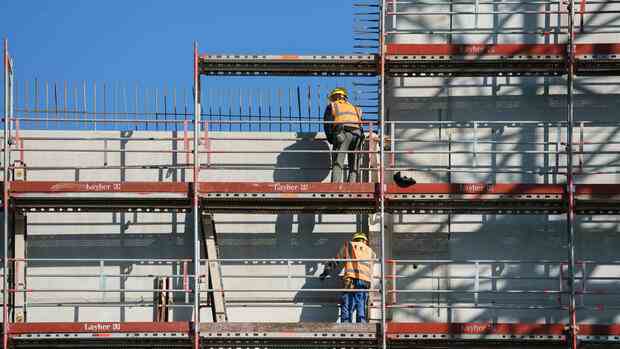Frankfurt After a weak start to the year, the business with new mortgage lending in Germany is likely to stagnate at a low level. “We assume that new business will remain weak until the middle of the year. It is possible that the volume in February and March will still be below the level in January,” says Tomas Rederer, partner at the consulting and auditing firm PwC.
In addition to the higher interest rates, the current industry environment is causing banks to become a bit more cautious, Rederer expects. “That will limit financing somewhat, but we don’t expect a full-scale ‘credit crunch’.” In the event of a so-called credit crunch, even interested parties with good credit ratings cannot get enough loans.
New business with private real estate loans has already collapsed as a result of the turnaround in interest rates. Now it is likely to be additionally dampened by the most recent banking crisis. In the first few months of 2022, a particularly large number of new construction loans – including many early extensions – were granted, after which the business plummeted due to the significant increase in construction interest rates.
At EUR 257 billion, new business was below the volume of the three previous years, PwC determined. In the course of 2022, however, the credit volume continued to rise and reached a high of EUR 1.57 trillion at the end of the year.
Loan rejection rate has increased
In January of this year, however, the portfolio of private real estate loans from German banks fell for the first time since 2016, specifically by around 1.5 billion euros compared to the previous month. New business in January was just 12.7 billion euros, the lowest since data collection began in 2003. In January 2022, new business was twice as high.
>> Read more here: More cancellations in German housing construction
The burden on borrowers is increasing due to the higher construction interest rates and the fact that real estate prices have hardly fallen. According to the PwC study, homebuyers spent 29 percent of their household income on the loan – by far the highest figure in the past ten years.
Most of the time, the proportion was a maximum of 22 percent. “In view of the higher interest rates, some of the people for whom it was previously possible can no longer afford real estate,” says PwC partner Rederer.
This is also due to the fact that banks reject loan requests more often. The rejection rate has risen recently: According to the credit agency Schufa, the demand for construction financing has recently picked up again. In January 2023, for example, banks had their credit ratings checked by Schufa ten percent more often than in January 2022, while lending fell.
on edge
29
percent
of their household income is what real estate buyers now spend on their loans on average.
German banks and savings banks are hit by the weakness in construction financing: private real estate loans make up the largest share in the loan book of German financial institutions at a good 40 percent. In addition, PwC concludes that profit margins have fallen significantly over the past year. The margins on these loans are traditionally relatively low, but the risk of default is also considered low.
New Bauspar contracts at a record level
Accordingly, the gross margins on real estate loans fell to 0.39 percent in 2022, by far the lowest value in ten years. In 2021 they were still 1.04 percent, in 2020 even 1.18 percent.
The reason for this: the banks’ refinancing costs have risen significantly more than the interest rates that they can charge their customers. Refinancing costs are the interest costs that banks have to bear themselves when they procure the funds for construction financing, for example.
>> Read more here: With higher rents against the housing shortage
To calculate the gross margin, PwC uses the five to ten-year effective interest rate and the banks’ refinancing costs in the form of mortgage Pfandbriefe. Pfandbriefe are bonds that banks use to borrow money from investors and provide investors with real estate loans as additional collateral.
Rising interest rates have recently prompted many Germans to rediscover building society savings. Since July, i.e. since the turnaround in interest rates in the euro zone, the monthly volume of newly concluded contracts has been significantly higher than in previous years.
According to PwC, new contracts reached a record volume of 10.3 billion euros in December 2022. Building society customers know exactly what the interest rate on the loan will be when they sign their contract, even though it can sometimes take over a decade before the loan is approved.
More: After Credit Suisse almost went bankrupt – your money is so safe now
